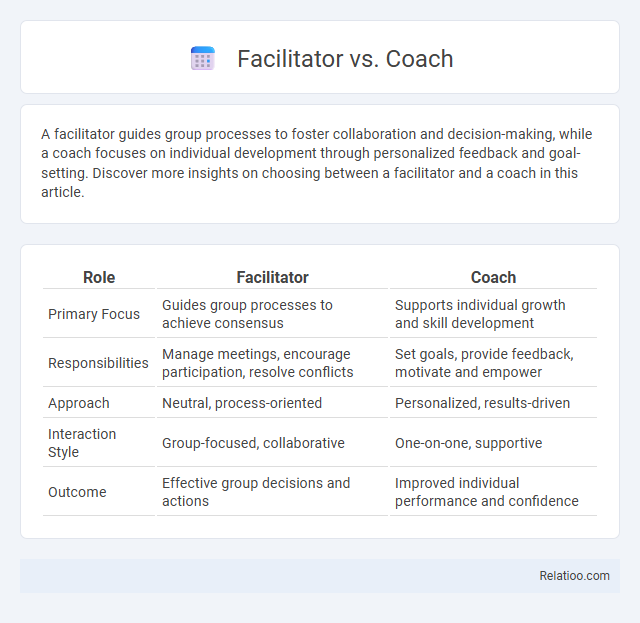A facilitator guides group processes to foster collaboration and decision-making, while a coach focuses on individual development through personalized feedback and goal-setting. Discover more insights on choosing between a facilitator and a coach in this article.
Table of Comparison
| Role | Facilitator | Coach |
|---|---|---|
| Primary Focus | Guides group processes to achieve consensus | Supports individual growth and skill development |
| Responsibilities | Manage meetings, encourage participation, resolve conflicts | Set goals, provide feedback, motivate and empower |
| Approach | Neutral, process-oriented | Personalized, results-driven |
| Interaction Style | Group-focused, collaborative | One-on-one, supportive |
| Outcome | Effective group decisions and actions | Improved individual performance and confidence |
Defining Facilitator and Coach
A facilitator guides group processes to ensure effective collaboration and communication, creating an environment where participants can collectively explore ideas and reach consensus. A coach focuses on individual development by providing personalized feedback, goal-setting, and skill-building to enhance performance and personal growth. While facilitators manage group dynamics and decision-making processes, coaches concentrate on empowering individuals to achieve specific professional or personal objectives.
Core Responsibilities of a Facilitator
A facilitator guides group discussions, manages dynamics, and ensures productive collaboration by creating an inclusive environment where all voices are heard. Unlike coaches, who focus on individual growth and performance, facilitators prioritize the group's process and outcomes without directing content or decisions. Your success in meetings or workshops depends largely on the facilitator's ability to foster communication, clarify objectives, and maintain neutrality throughout the session.
Core Responsibilities of a Coach
A coach primarily focuses on empowering individuals to unlock their potential through personalized guidance, goal setting, and accountability. Core responsibilities include active listening, asking powerful questions, and providing constructive feedback to facilitate self-discovery and skill development. Unlike facilitators who guide group processes or trainers who impart knowledge, coaches tailor their approach to individual growth and performance improvement.
Key Differences between Facilitation and Coaching
Facilitation focuses on guiding group discussions and processes to achieve consensus and collective decision-making, while coaching centers on one-on-one personalized development to enhance individual performance and goal achievement. Facilitators maintain neutrality and encourage collaborative interaction, whereas coaches provide tailored feedback and strategies to support personal growth. Key differences include the scope of influence--group versus individual--and the methods of engagement, with facilitation emphasizing process management and coaching prioritizing skill-building and motivation.
Skills Required for Each Role
Facilitators require strong group management skills, active listening, and the ability to guide discussions toward consensus without imposing solutions. Coaches need expertise in goal-setting, motivational techniques, and personalized feedback to support individual growth and performance improvement. Trainers must possess instructional design skills, subject matter expertise, and clear communication to effectively deliver knowledge and develop competencies.
Common Scenarios for Facilitators and Coaches
Facilitators often guide group discussions, workshops, and decision-making processes in corporate or educational settings to ensure collaboration and clarity. Coaches focus on individual or team development, offering personalized guidance and skill-building in performance improvement, leadership, or career growth. Common scenarios for facilitators include strategic planning sessions and conflict resolution meetings, while coaches typically engage in one-on-one or small group coaching sessions for goal achievement and behavioral change.
Benefits of Effective Facilitation
Effective facilitation enhances group collaboration by guiding discussions, resolving conflicts, and ensuring all voices are heard, leading to more productive outcomes. Unlike coaching, which focuses on individual growth, facilitation drives collective decision-making and fosters innovation through structured engagement. Investing in skilled facilitators results in streamlined meetings, increased participant satisfaction, and accelerated achievement of organizational goals.
Benefits of Effective Coaching
Effective coaching enhances individual performance by fostering self-awareness, goal clarity, and skill development, leading to measurable improvements in productivity. Unlike facilitators who guide group processes or trainers who deliver structured content, coaches provide personalized support tailored to each client's unique challenges and aspirations. This targeted approach promotes sustainable growth, increased motivation, and stronger problem-solving abilities in professional settings.
How to Choose between a Facilitator and a Coach
Choosing between a facilitator and a coach depends on the specific needs of your team or individual development goals. Facilitators excel in guiding group processes, managing meetings, and fostering collaboration to achieve collective outcomes, while coaches focus on personalized development, skill-building, and motivation through one-on-one interactions. Assess whether the priority is enhancing group dynamics or individual growth to determine the most effective professional for your situation.
Combining Facilitation and Coaching Approaches
Combining facilitation and coaching approaches enhances your ability to guide group dynamics while fostering individual growth. Facilitators focus on structuring conversations and ensuring collaborative decision-making, whereas coaches emphasize personalized development through goal-setting and feedback. Integrating both methods maximizes engagement, accelerates learning, and supports sustained behavioral change in teams.

Infographic: Facilitator vs Coach
 relatioo.com
relatioo.com